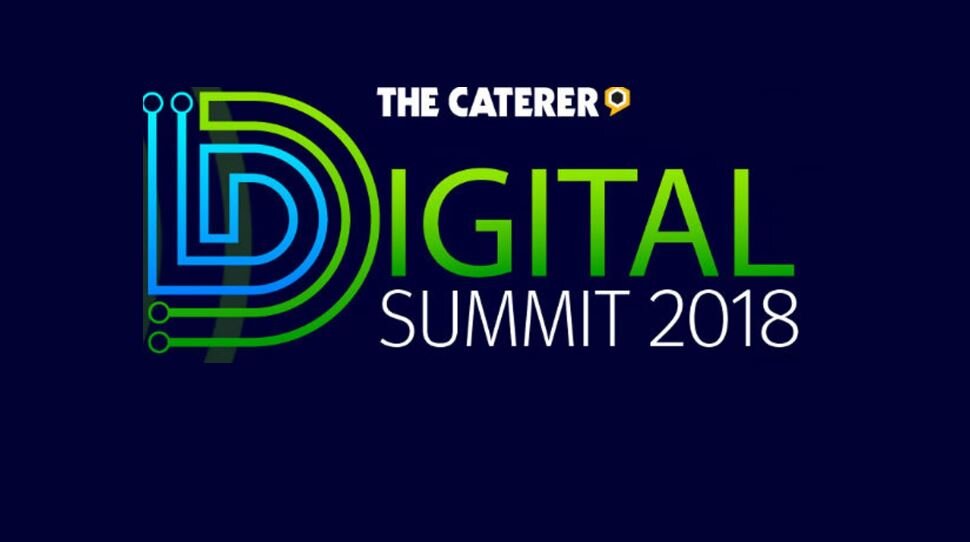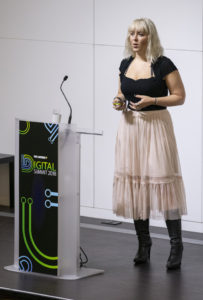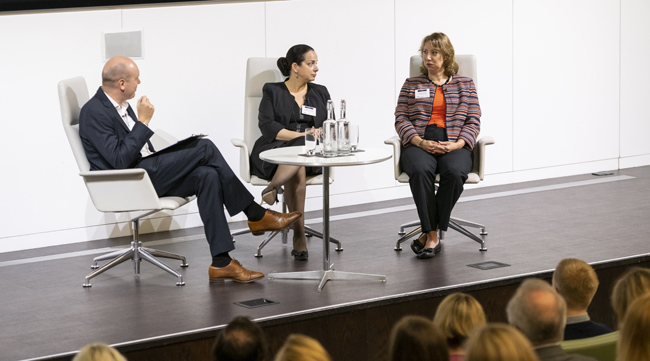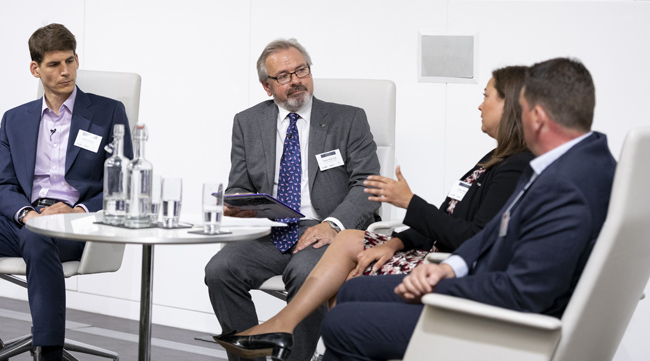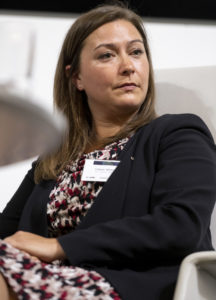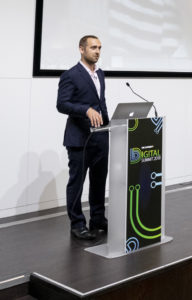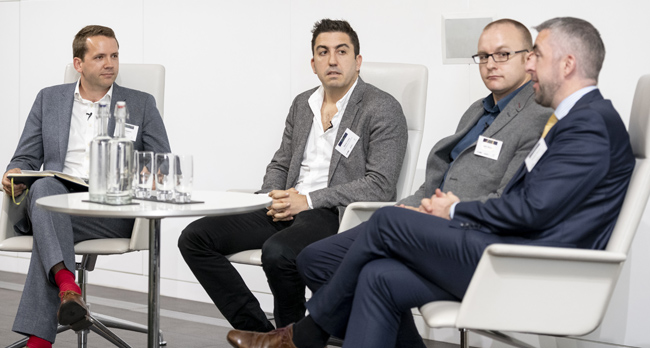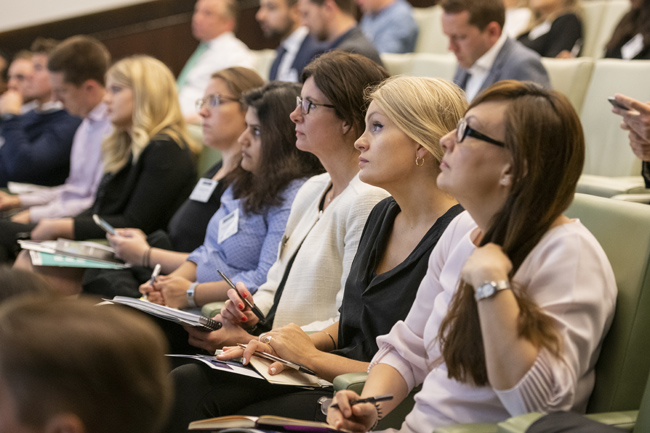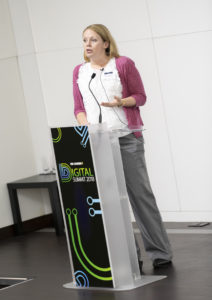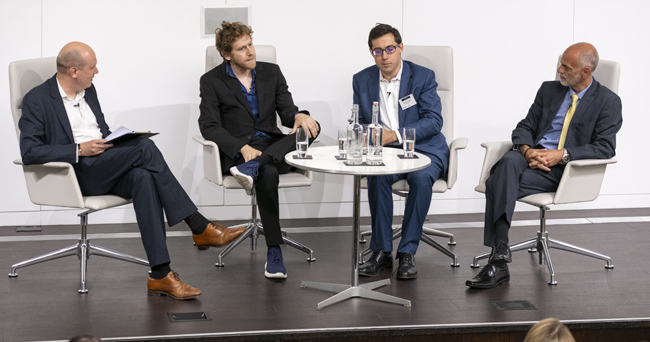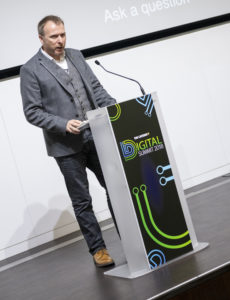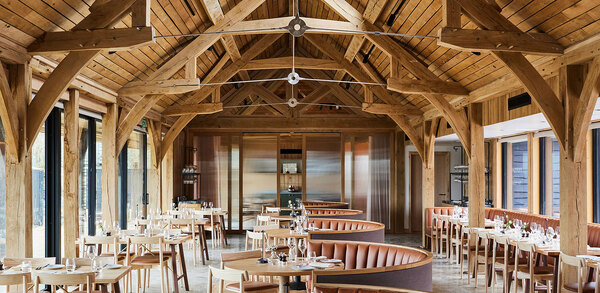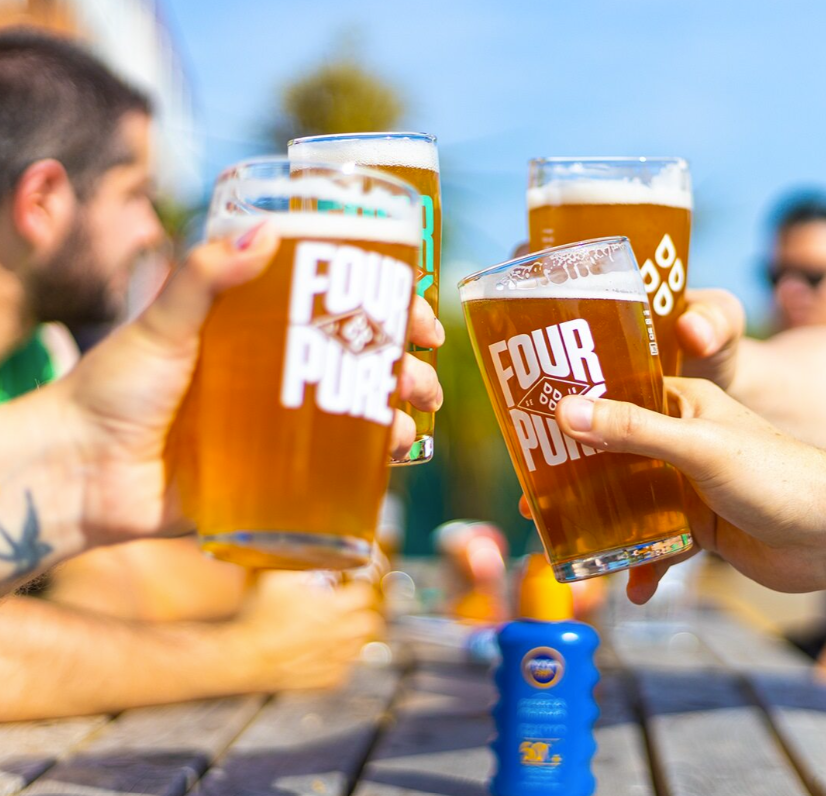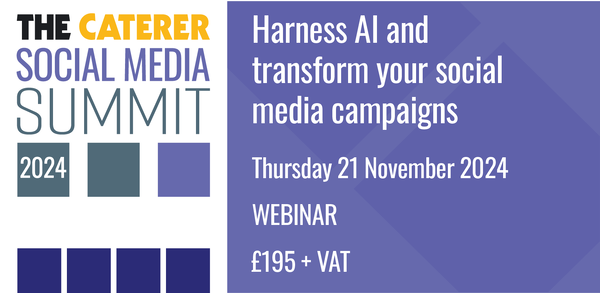Digital Summit 2018: Guest obsession, data harmony and marketing to millennials
It was all about the guest at The Caterer's Digital Summit this year, as hospitality's sharpest technology experts shared business-boosting ideas on everything from gameification to user-friendly websites and the latest innovations. Rosalind Mullen reports
Improving the digital customer experience: market like the disruptors
In a world where online travel agents (OTAs) dominate marketing and Airbnb is competition, delegates were only too aware of how technology is disrupting their market. So all attention was on Athena Simpson, partner and chief marketing officer at YFood, who hit the podium with a call to action to get into the disrupter mindset and to use unconventional technology: "Think of the challenges in your business and think of a technological solution," she urged.
To get the marketing edge for your business, Simpson shared some tactics currently being used by innovative brands:
Stalk your customers to understand where they go, what drives them and what they think about you by using platforms such as: •
â¢Â Cheerfy â" a WiFi-based customer-recognition tool or âtech-conciergeâ that collects information on guest preferences.
â¢Â Yumpingo â" guests give detailed feedback on dishes via a tablet that is presented instead of a paper bill.
â¢Â Flyt â" a âgame-changerâ that integrates information from social media, OTAs, apps and so on.
â¢Â Co-branding has made Wagamama one of the most influential platforms in the UK. With veganism on the rise, it has co-branded with vegan chef King Cook of CookDaily to access and âinfluenceâ more diners.
â¢Â Tribe is a social media campaign where your fans create content and you only pay for it if you want it.
Gameification â¢Â Maxwellâs restaurant in Covent Garden created a Pokémon menu to celebrate their location being a âPokéStopâ in Pokemon GO, driving a 26% increase in revenue in 2016.
Has GDPR broken your business?
With the General Data Protection Regulation (GDPR) at the top of everyoneâs to-do list, the summit was the perfect opportunity for a reality check. The Caterer deputy editor James Stagg invited Kate Brimsted, UK head of data privacy and cyber-security at Bryan Cave Leighton Paisner, and Stephanie Timsit, director of finance at the Mandarin Oriental Group, to discuss what it means to be truly compliant.
âBoth speakers stressed that the guest has to opt-in rather than opt-out to their data being used â" and that includes information about allergens. Brimsted said: âEven food preferences can be seen as sensitive. For instance, noting a halal preference indicates religious leanings. Ask yourself âhave they given explicit consent to use this information?ââ
She acknowledged that data retention is a minefield, but pointed out: âThe Information Commissionerâs Office (ICO) suggests you can use legitimate interests on the grounds that the hospitality industry has a business interest in having processes to welcome guests back. But it needs to be balanced.â
So with shrinking databases, will GDPR end reliance on e-marketing? Timsit believes you just need new processes to get your customersâ consent: âThe ICOâs line is that you want good-quality data about people who [do] open your emails. So focus on quality. If you have too much information, youâre not using it well.â
Bookings and guest conversions
Pride of Britain chief executive Peter Hancock chaired a lively discussion on the topic with a panel of hoteliers: Jim Cockell, owner of the Old Stocks in Stow-on-the-Wold in the Cotswolds; Matthias Mahr, revenue and marketing director at Hand Picked Hotels; and Claire Wilson, marketing manager at the Calcot Collection. Here are a few highlightsâ¦
Matthias Mahr (MM): About a third, because weddings, for instance, are not booked online.
Claire Wilson (CW): Some 30%, whereas five years ago it was 11%, and 10 years ago, 4%.
Jim Cockell (JC): About 35%, up from 24% three years ago. Bookings are a 50/50 split with OTAs.
What steps have you taken to make your website user-friendly?
JC: Sites need images and content to give guests a feel of what to expect. We use descriptors such as âSmart TVâ rather than just âTVâ and talk about âsleepingâ rather than âroomsâ. The website includes calls to action, room layouts and so on. We do two photoshoots a year. Last year, we invested in a virtual tour of all the rooms and they are the highest-thumbed pages on our site. It manages guest expectations and customers like it because they are nosy. It drives business.
What can we learn from OTAs?
MM: They are important partners. They bring us a lot of business and from there we want to get direct bookings. We can learn from their simplicity in having just a few steps to booking.
How do you manage the OTA no-show and cancellation policy?
JC: You can remove room types and sell direct. Some operators close out weekends on OTAs. On the back of the virtual tour we restrict OTA bookings by giving guests the advantage of choosing their room if they book direct. There is rate parity, but we include breakfast with direct bookings and we highlight that on our website.
What do hospitality guests want from technology?
Ordamo creates interactive digital menu-based ordering systems for restaurants. Who better, then, than chief executive Daniel Potter to reveal its findings on the relevance of technology to guests and what works for the operator. Hereâs a quick round-up:
âItâs not about removing human interaction, itâs about improving efficiency,â said Potter. âMore than 50% of guests said waiting too long for the bill put them off.â
Upselling Touch technology encourages people to act on impulse. For instance, introducing Crave interactive tablets into rooms saw room service sales at one hotel rise by 20%. The same goes for ordering food on tablets: âPeople order more if they donât have a running total,â said Potter.
Improved loyalty Engaged customers buy 90% more frequently and spend 60% more per transaction. They deliver three times the value to a brand over a year.
Meaningful insights Tablets can collect feedback. Potter said: âFor example, get guests to rate dishes and take any underperforming dishes off the menu after three months. By engaging, listening and reacting you bring guests back in.â
However, he warned against using gimmicks and said new technology must be easy to use, reduce costs and save time. âAs a customer you want to book and pay on the same gadget and get an offer a few days later. Technology that delivers this will add value.â
Delivering technology to tempt diners
Even though the company is 53 years old, he said it has embraced technology to âgive the customer the best-possible experienceâ. But he added: âWe need to be slightly cautious as going out to eat is still a personal experience.â
To build loyalty, PizzaExpress relaunched its app in March to allow customers to pay for their meal at the table. âWe know 69% of consumers find waiting for a bill most irritating. The app allows diners to pay at the table and gives them treats and offers.â
It also lets users split the bill, find their nearest restaurant, browse the menu, book a table and collect customer rewards.
âThe ultimate goal of the app is for people to engage as part of the companyâs customer relationship management strategy. Paying at the table is a big consumer need, so we are going out on that,â said Love.
He said the chain had also embraced gameification, with the launch of an augmented-reality game called Doughball (scheduled for June).
âWe know that 30% of smartphone users use augmented reality. It will be worth $90b (£68b) by 2020, so we want to dabble,â said Love. But he warned: âNot all technology solutions are appropriate across all restaurants and food types. You have to understand what your customer base wants.â
The millennial divide â" how it is forcing us to do business differently
He urged delegates to employ ârapid-action teamsâ focused on embracing change. âTechnology is a facilitator of change,â he said.
To complicate matters, he said those millennials born pre-1986 are driving convenience in the shape of Deliveroo, Uber and Google Maps, while those born after are looking for rich experiences and âdriving a morph between entertainment and food that can be shared on Instagramâ.
Danks said many operators were responding to the demand for convenience and instant gratification. For instance, KFC has reduced its order times from five minutes to three; and click-and-collect has grown â" take Sainsburyâs Chop Chop, which delivers âdinner for tonightâ within a 60-minute slot.
He told delegates that millennials are also increasing the size of new markets, such as vegan and vegetarian. Veggie Pret opened in Hong Kong and is seeing 40% better performance than its original site, and KFC is also launching a veggie site.
âThe key is to identify a trend versus a fad,â said Danks. âYou need to understand price versus value, and ethics versus environment.â
As for artificial intelligence, Danks said it is a certainty for emerging generations. âThe next lotâs ability to adapt to change will be even more pronounced than millennials,â he said.
Customer engagement â" streamlining the user experience
The Catererâs editor Chris Gamm chaired this panel discussion, gaining insights from Fergal Byrne, head of online at the Doyle Collection; Steve Lowy, chairman of the Hotel Marketing Association; and Sam Weston, marketing manager at 80 Days and founder of Hotel Speak. Hereâs a glimpse of what the audience learnedâ¦
Sam Weston (SW): Reach people at the dreaming phase through quality website content, page speed and responsiveness.
Steve Lowy (SL): There are quick wins â" aim to be number one on Google Maps, Hotelfinder and voice search.
How do you make your site sticky?
Fergal Byrne (FB): Use A/B testing [to compare two versions of a web page]. Weâve been doing subtle A/B tests this year because we are developing a new website with user paths that feed into one landing page. Consumers want that information immediately. We need to be able to monitor the conversation rate. We did user testing to see, for example, how easy it was to find the address of a hotel.
SL: We did A/B testing to find out why people purchase a suite, and we found that it depended on where we located a room type on the page. We are now selling the more expensive rooms by enabling guests to click at the top and book.
SW: We have done some work on room conversions. Customers respond better if you call a room âcosyâ, rather than âsmallâ, for instance. Apex hotels changed âcheck availabilityâ to âbook nowâ. It resulted in a 0.05% gain â" small, but it was a gain.
How do you use data to make smarter decisions?
FB: Look at traffic, conversion and effect of pricing from as many sources as possible.
SL: It helped one operator with the challenge of managing 275 apartments in 17 locations that are only free three times a year. AI back of house will be crucial to crunch data.
How do you communicate with guests?
FB: We use data to enhance the customer experience. For instance, we ask guests when they are likely to check in so we can manage the desk at busy times.
SW: Add value by understanding when to market. We find 12 days prior to the booking is the sweet spot to encourage a room upgrade.
SL: Show appreciation to guests who book direct. Marriott thanks guests by showing the charge for WiFi, but then taking it off the bill. At checkout, remind customers to book direct next time.
How technology is influencing the guest experience
Queuing blocks footfall More than half of caterers recognised that standing in line can kill loyalty. Technology can help by, for instance, giving customers the ability to pre-book and order ahead; and by providing self-scan and cashless payment methods, such as a loyalty card or mobile app to unblock till points â" in fact, 23% of operators will implement this in next three years.
Food waste is a challenge With 52% of caterers saying they could improve operational efficiencies by tackling this. It can be reduced through pre-order or meal packages to predict requirements. Lampard said: âOverall, putting technology in place is important. People expect it and by doing it you can see physical, tangible benefits in terms of revenue, order value, efficiency and staff.â
New digital and data trends in hospitality
The last session of the day was chaired by The Catererâs deputy editor James Stagg, who grilled Daniel Clark, UK executive operations director at Delaware North, Richard Clarke, senior analyst of European Leisure & Hotels at Bernstein, and Daniel Potter, chief executive of Ordamo, on whatâs really hot.
Daniel Clark (DC): At Wembley we recently had two concerts and we needed 4,500 staff over the weekend. We use tablets and phones and the workforce can customise when and how they work. We also use web-based platforms and the ability to have live information on costs is essential for us. We can use technology to manage the basic wage and keep abreast of volumes.
We can also enter data into the point of sale and can deliver stock to units before they run out. Only a fifth of the workforce is needed to maintain stock levels so there is a cost benefit.
How are consumers using technology?
DC: Three or four years ago only 4% of customers used credit cards and now that is 62%. People spend 27% more if they have a credit card. Online cash systems also help with till-pilfering. We have 960 tills at Wembley and 50% are now card-only. We have a wave- and-pay bar for drinks, which dispenses a pint when you tap it. Itâs a gimmick, and only 13% of guests use it, but it enhances our offer. The US is ahead, whereby sports fans use technology to order in-seat dining. British fans donât want that yet.
DP: Using tablets in restaurants is slow to take off in the UK, but it will grow. In hotels, in-room ordering via Crave digital tablets are seeing a 350% return on investment.
Why should you invest in technology?
RC: The customer expects it. For instance, Tesco is now doing home deliveries and probably sells less, but the customer expects it. The UK is ahead in food delivery and online shopping.
Which hospitality companies will disappear over the next five years?
RC: The OTAs will be under more pressure. They only have a finite number of rooms and their âcontentâ doesnât want to use them because their commissions are too high. They need to do more to keep their content happy.
Tech tips of the day â¢Â Question whether you need to spend a fortune on marketing
â¢Â Keep your website and technology simple and easy to use
⢠Be customer-obsessed and make data your friend
â¢Â Start engaging with who your customer is and listen to them
â¢Â Try new channels and social platforms. It is easier to get customers to talk about you than to talk about yourself
â¢Â Snapchat resonates with younger people; Instagram is used for food; and the older generation is still using Facebook
â¢Â Set measurements and goals, use trial and error and think long-term
â¢Â Use technology to increase efficiency and win more loyal customers
The third way: how Noetic is helping hotels to build a 21st-century business



